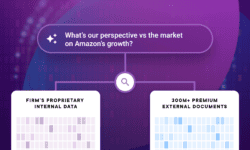Over the past few months, generative artificial intelligence(genAI) has revolutionized countless industries—consulting being no exception. There’s a myriad of tools derived from this technology on the market today that not only enhance a consultant’s workflow but benefit their clients.
For consultants, this iteration of artificial intelligence can analyze data and improve decision-making, as well as problem-solving—ultimately streamlining hours, if not days, of work. For clients, genAI’s advanced data analysis can greatly enhance the quality and depth of a consultant’s recommendations.
And while it seems there’s no end to how generative AI can simplify the day-to-day for consultants and inform client strategy, many still question its reliability. Industry leaders are wondering: what are the cons of genAI within the consulting space? Does the risk of a new and potentially unethical technology like genAI outweigh the competitive advantage it offers? And perhaps most importantly, is generative AI in consulting the future of the industry?
Below, we weigh the pros and cons of wielding this exciting technology, and share the tools that could benefit your firm.
The Impact and Benefits of Generative AI on Consulting
One of the main applications of genAI in consulting is aiding a consultant’s decision-making process to improve customer experiences and outcomes. Most professionals encounter complex decisions that require thorough, and often time-consuming, analysis and evaluation of market hypotheticals. But genAI algorithms can simulate various scenarios, considering numerous variables and constraints, to assist consultants in making well-informed decisions.
GenAI’s ability to improve decision-making relies on a few of capabilities:
- Enhanced Data Analysis: Because genAI can process massive amounts of data quickly and accurately, consultants are able to easily extract valuable insights buried under useless information in complex data sets. As a result, they can provide data-driven recommendations and strategies, leading to more informed decision-making for their clients.
- Efficient Problem-Solving: In a volatile market, genAI’s ability to simulate and predict various scenarios is especially valuable. It can produce strategy-simulations to assess the potential outcomes and risks associated with different decisions, ensuring that clients receive the most well-informed and effective recommendations.
- Customized Recommendations: Rather than spending hours or days searching for and analyzing specific datasets, genAI leverages learning models to synthesize information according to the needs of a consulting project or client. The result? Tailor-made recommendations and insights that address unique challenges and objectives, ultimately strengthening a consultant-client relationship and increasing the likelihood of successful outcomes.
Use Cases for GenAI in Consulting
There’s no downplaying the immense potential of generative AI and how it could solve various, complex problems faced by consultants in their day-to-day. By leveraging generative AI-powered tools, consultants can enhance their pace, accuracy, and decision-making capabilities—resulting in a more efficient and effective firm.
- Collaboration and Knowledge Management: By serving as a platform for sharing knowledge and capturing collective expertise, genAI empowers consultants to collaborate more efficiently on projects, exchange valuable insights, and build upon one another’s ideas. The end result leads to the development of more innovative and impactful consulting services.
- Expediting Innovation Cycles: Consulting firms can expedite their clients’ innovation cycles by incorporating genAI, which automates time-consuming tasks such as data analysis, market research, and trend identification. This automation allows consultants to redirect their focus toward higher-value activities like strategic thinking and creative problem-solving, resulting in faster and more efficient innovation processes.
- Promoting Responsible and Ethical Innovation: Today, firms shoulder the responsibility of ensuring the ethical and responsible use of AI technologies. By actively embracing and integrating genAI into their innovation processes, consulting firms not only set a positive example but also establish standards for the responsible utilization of AI. This approach also helps address potential risks and biases associated with AI implementation, fostering innovation that is both responsible and ethical.
- Predictive modeling and forecasting: With genAI, consultants can build predictive models that forecast future scenarios based on historical and real-time data. This capability allows businesses to anticipate market trends, customer behavior, and demand fluctuations,
Risks and Drawbacks of Generative AI
While generative AI is being touted across industries as money and time saver for professionals and their workloads, it comes with its own set of risks and drawbacks.
One of the main concerns is the potential for bias in the algorithms used. Since generative AI models rely on machine learning and existing data to create new content, any biases present in the data can be amplified and perpetuated. This could lead to biased recommendations and decisions, which could subsequently have negative consequences for clients.
The core of an unbiased algorithm starts with the content sets it’s based on. Vetting data sources that serve as the foundation for an AI system’s knowledge becomes critical to ensuring reliable results or decisions.
A lack of transparency in genAI’s algorithm is also a concern amongst firms. Unlike traditional consulting methods where consultants can explain their reasoning and provide clear justifications for their recommendations, genAI often works as a “black box”—providing outputs without clear explanations and therefore making it difficult for consultants to fully understand or justify the reasoning behind the recommendations.
And with any piece of technology, there is always the risk of errors and inaccuracies in the output generated. While genAI is designed to analyze and process large amounts of data, it is not infallible. Mistakes in the data or flaws in the algorithm can result in incorrect or misleading recommendations, making it all the more important for consultants to understand the limitations of the technology and implement appropriate checks and balances.
The Ethical Considerations of GenAI
With genAI’s quick overtake, there’s virtually no national government oversight over how public or private companies wield this technology. What’s even more troubling, however, is the lack of federal and legislative intervention to ensure these programs aren’t encoded with structural flaws that could greatly impact end users.
ChatGPT and GPT-4, byproducts of largely consumer-focused GenAI that utilize interfaces from OpenAI, are capable of holding conversations, answering questions, and even writing low-grade high school essays. However, this past February when the New York Times published their troubling conversations with Bing’s chatbot, Sydney, which sent messages that ranged from promoting infidelity to expressing a desire to be “alive”, speculation arose concerning where these tools were pulling their training data from.
That’s why it has become increasingly important for consultants to understand the potential consequences and gray areas of relying on genAI.
The following are some ethical considerations to keep in mind:
- Transparency and Disclosure: When using genAI for recommendations, it’s important to inform clients about the involvement of AI technology in the consulting process. Transparency regarding the use of AI-generated content ensures that clients are aware and can make informed decisions, and it builds trust between you and your client.
- Privacy and Data Protection: Since generative AI technology often requires large amounts of data to produce content, consultants must ensure that they have the necessary consent and legal frameworks in place to collect and use client data responsibly. Protecting client privacy and complying with data protection regulations should be a top priority.
- Bias and Fairness: AI systems, including generative AI, can be susceptible to biases present in the data they are trained on. Consultants must be cautious about the potential biases that may emerge in the generated content and take steps to identify and mitigate them. Regularly assessing and auditing the AI models for fairness can help address any bias-related concerns.
- Accountability and Liability: When utilizing genAI, consultants should clearly define the roles and responsibilities of both human consultants and AI systems. This is essential to establish accountability and liability.
- Algorithm Training Datasets: The limitations of genAI’s output can be unreliable when dealing with intricate business cases, where accurate and detailed information is imperative. Most genAI learning models lack a large database of business-grade content to extract insights from, and rather rely on general internet text to create output for complex and nuanced business strategies. This lack of technological knowledge leaves room for error when making informed business decisions based on genAI.
Unsure of how to evaluate your genAI tools or ensure they’re providing more value than harm to your workflow? Download our infosheet, 4 Key Considerations for Generative AI in Market Research Workflows, to get the answers you need.
Raise Your Organizational IQ With AlphaSense
Unlike other consumer-grade generative AI tools trained on publicly available data, AlphaSense takes an entirely different approach. Our industry-leading suite of generative AI tools is purpose-built to deliver business-grade insights and leans on 10+ years of AI tech development.
Our proprietary AlphaSense Large Language Model (ASLLM)—trained specifically on business and financial data—matches or beats the leading third-party LLMs over 90% of the time. It’s no mystery as to why more and more leading consulting firms are integrating AlphaSense into their workflows to gain a competitive edge.
Our suite of tools currently includes:
- Smart Summaries – this feature allows you to glean instant earnings insights—reducing time spent on research during earnings season, quickly capture company outlook, and generate an expert-approved SWOT analysis straight from former competitors, partners, and employees
- Enterprise Intelligence – a first-of-its-kind offering that delivers AlphaSense’s AI-powered search and summarization capabilities to customers’ internal organizational knowledge.
- AlphaSense Assistant – a generative AI chat experience that transforms how users can extract insights from hundreds of millions of premium content sources
Here is why our genAI features are purpose-built for the challenges and complexities businesses are currently facing in decision-making:
- Built for business & finance: our decade-long investment in AI has allowed us to develop technology built specifically to hone in on financial and business information, capturing insights with reliability and precision—and without hallucination.
- Trustworthy sources: Our generative AI draws on a content database filled with top-tier business and financial content, meaning our users can be confident that the summarizations come from the most trustworthy and relevant sources.
- Easy auditability: Users can easily check the original content for context and validation with one-click citations—a critical capability for our customers who are relying on the insights that we deliver to power million-dollar decisions every day.
Curious to learn how these new iterations of AI are revolutionizing your workforce? In our State of Generative AI & Market Intelligence Report 2023, 65% of respondents say they have used AI tools within their research, while 70% report integrating genAI chat dialogue tools into their workflows. Download our report to learn the future of genAI in your industry.
We’re constantly reinventing how AlphaSense can help professionals succeed in their market today by continuously adding new features to our platform that will streamline the market intelligence research process. And leaders of our industry are taking note, as this past April, we received a $100 million extension to our Series D financing round, led by CapitalG, Alphabet’s independent growth fund. Read the full press release here to learn how we’re acting on our mission with the release of AlphaSense’s Smart Summaries.
Don’t miss our State of Generative AI & Market Intelligence Report 2023.
Start your free trial of AlphaSense today.




